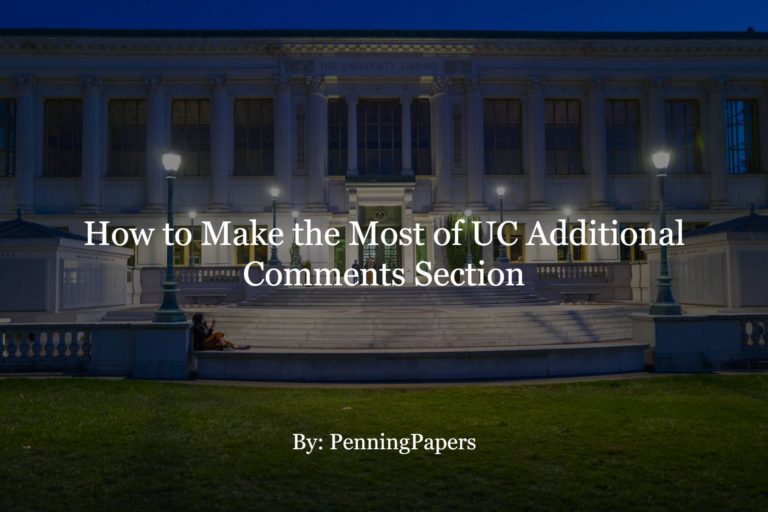If you’re looking for how to write the UC Additional Comments section, want to know how to make the most of it, or are just generally confused by it, look no further!
We’ve compiled everything you need to know to write a winning Additional Comments Section in the UC application that will portray your application in the best light.
In addition, we’ve made this guide shorter than our usual ones.
While this guide is shorter than our other articles, note that each of these points is crucial to creating a solid statement that helps admissions officers see the best in you.
So, do take your time understanding these points!
With that said, let’s get right to it.
Table of Contents
- How to Write the UC Additional Comments Section (For Personal Insight Question).
- UC Application Additional Comments Section: Writing About Academic History (For Academic History).
- How Do I Write About a Drop in Grades in My UC Additional Comments Section?
- Do I Need to Fill Out the UC Additional Comments Section?
Professional College Application Help.
Contact us. We'll get to you within 24 hours.
1. How to Write the UC Additional Comments Section (For Personal Insight Question).

As you may have already seen in your UC application portal, there are two different UC Additional Comments Sections. One is after the UC PIQs. The other is after the Academic History section.
This section will cover the one after the PIQs.
This section has a 550-word limit.
The UC Additional Comments Section should be reserved for unusual circumstances regarding your application and background that you otherwise could not write about in your original personal insight questions.
So, let’s say you have a unique project you’ve conducted that sold a few copies and made a profit over time. But, there are unusual details such as learning marketing skills and vital networking abilities you needed to garner over time to truly achieve what you could have done. Perhaps these details are too difficult to elaborate on in the PIQ section.
Your goal is to guide admissions officers step-by-step. It’s crucial that you’re very clear with what’s going on so that no one misinterprets your words.
Think of the UC Additional Comments Section as a way of explaining hard concepts to an outsider. They have no knowledge of your situation. So, it needs to be comprehensible in one read even if they are outsiders.
In another example, let’s say you had very few extracurriculars in your resume and wish to explain this gap. There, you will need to write very clearly why you were unable to truly earn what you hoped to.
It’s important to note that the UC Additional Comments Section is an EXPLANATORY section. It is NOT the place for purple prose and fancy writing that would make admissions officers feel sorry for you.
Your job is to make things as clear and understandable as possible.
So, don’t try to sway admissions officers with fancy words that will get them to take pity on you. Instead, elaborate clearly, and effectively, and attempt to help them understand the difficulty of your situation such that they can see how hard your situation was without fancy wording.
If it’s the case you wrote your UC Additional Comments Section about a traumatic experience and have trouble articulating how it affected your academic experience, you may need to think of it from a practical perspective.
What were some of the difficulties afforded to you after your traumatic experiences? How did they make everyday routines such as studying, homework completion, and extracurriculars difficult? Did it make you more socially isolated and therefore not have as much time to pursue other projects? Did the fear instilled in you make you less likely to be confident in your own work, and therefore lead to a positive feedback loop? Or, has psychological damage made certain routines other students could otherwise commit to normally seemingly impossible to overcome?
It’s very important that you try to guide the admissions officers step by step. By doing so, they can have an easier understanding of your situation without needing to resort to arbitrary assumptions and conjecture.
2. UC Application Additional Comments Section (For Academic History).

Now, let’s talk about the UC PIQs after the Academic History section.
For the one after the Academic History section, you are given a 550-character limit.
The same principle applies to the first section: you need to be very specific about the additional comments you plan to elaborate on.
If you’re not hyper-specific about what you want to explain, you can’t rely on admissions officers magically knowing how to connect all the dots to your situation.
Let’s say that you took a course that had an unusual circumstance. Your teacher went through a traumatic experience alongside having to deal with the school’s administrative dysfunction, which led to a class mostly unmonitored, unmoderated, and ultimately unrestricted. As a result, both you and virtually everyone you know in your class receive an F.
If you were to describe this experience to admissions officers, you need to be rather vivid in how descriptive you are. Remember, we’re not inciting them to pick up their torches and pitchforks here. We’re just getting you to explain things in as articulate a way as possible so that admissions officers can make their own judgments.
So, tell them that the school had dysfunction and the teacher was not in a position that was conducive to a proper learning environment; but, be sure to emphasize that you do NOT hold it against anyone as a result. Also, don’t forget to emphasize what made it difficult or impossible for you to perform at the level you originally wanted to. Be specific about how your mode of operations could not work as well.
3. How Do I Write About a Drop in Grades in My UC Additional Comments Section?

Now, let’s say you want to write about a drop in grades in your UC additional comments section.
If you had a dip in your academic performance, your admissions officers may wonder two things:
- What is your lower performance over time indicative of?
- Can the admissions office have confidence that you can continue to perform well over time while attending college?
Writing about a downtrend in academic performance is going to be hard. You’ll need to address both of these questions to the admissions office.
So, let’s break down questions 1 and 2 below.
A downtrend, or low grades in general, can represent numerous things. Did your grades drop because you were lazy? Perhaps. Was it because you took on more difficult classes than you could have expected? Sure! Did you perform poorly because of external factors that got in the way such as familial emergencies or health risks? It’s possible!
Your reasons are valid.
However, there’s an interesting technique you can do when writing the UC additional comments section: you can actually turn your lower grades from a negative into a positive.
Instead of writing ONLY about how your grades have dipped, use it as an opportunity to show positive aspects about yourself.
Let’s take a look at an example:
Let’s say that you went from a 3.85 GPA in your Sophomore year to a 3.60 GPA in your Junior year. And, it was primarily due to you getting a low grade in your Math class.
“In my Junior year, my Math class was unexpectedly more difficult than I could handle. Initially, I was hoping to take a more advanced level of Math because I was at least somewhat familiar with the course content a year beforehand. However, circumstances unrelated to academics —specifically, my familial financial emergencies leading to unexpected turmoil in the household— made studying virtually impossible.
Interestingly, I learned a lot from this downtrend in performance. I realized that predictions are not always binary; and, there are multiple variables that can come into play to determine whether I’m “ready” to truly perform at my best.
Had I seen the signs of financial turmoil looming close in my household, and not hyper fixated on my academic performance, I would, ironically, have chosen a course load that I could have wisely handled. I recognize I’m surely to blame for the matter; and, I’m wiser now and plan to carry on this knowledge to my experience at the University of California”
Example UC Additional Comments Section —Explaining a Drop in Grades
4. Do I Need to Fill Out the UC Additional Comments Section?

We also sometimes get asked whether it’s absolutely necessary for all students to answer the UC additional comments section.
While the UC Additional Comments Section is not required, students often have more qualified content to write than they expect. Thus, many who leave the Additional Comments Section blank lose the opportunity to increase their admissions chances.
Students will often say, “I don’t need to fill out the UC Additional Comments Section because I have nothing noteworthy to say.”
“I have no sad background.”
“I have no unusual experiences.”
“I had it easy in life.”
These are all reasons not to fill out the UC Application’s Additional Comments Section. But, it’s often our experience here working with students that these exact applicants actually have MUCH MORE to write about than they think.
Many live in loud households with thin walls that make studying hard.
Others have undiagnosed conditions such as Depression, Anxiety, and ADHD.
A good number of students have external personal problems that actually have a more significant impact on their academic performance than they originally thought. Sometimes, the lack of motivation and will to perform in class is actually rooted in factors like bullying, social media, and other complex issues that most students can’t articulate.
If you truly don’t have anything to write in the UC Additional Comments Section, you are free to leave it blank. Admissions officers will not hold it against you.
But, before you click that submit button, we implore you to take some time to reflect on whether you truly have nothing worthy to write about. If you’re not sure whether you’re leaving extra content to write about, consider speaking with an expert college admissions advisor and consultant who can help you brainstorm great additional comments topics to write about.
If you’re still stuck on how to write the UC Additional Comments Section, feel free to ask us for help! Schedule a free consultation with us, and we’ll get back to you within 24 hours! Our college admissions essay experts and consultants have had years of experience, and have helped students get into some of the most prestigious universities in the nation including Brown, UPenn, Cornell, Duke, NYU, USC, and UCB.

